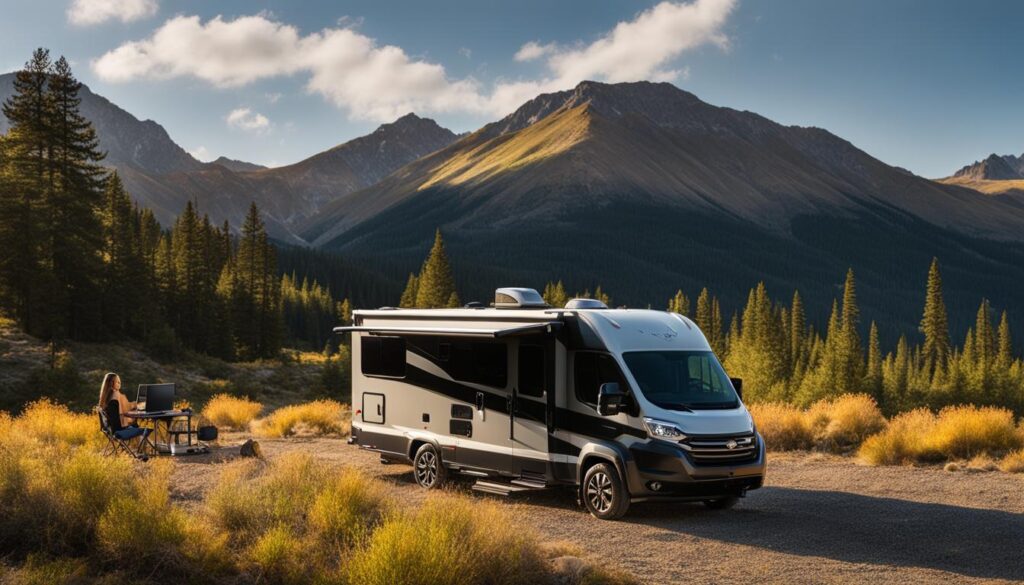Are you planning to hit the open road in your RV while working full time? If so, there’s one essential thing you need to ensure a smooth and productive journey – the best internet for RV. Staying connected is crucial for remote work, entertainment, and keeping in touch with loved ones. But with so many options available, finding the ideal RV internet service can be challenging.
In this article, I will guide you through the top providers and plans for reliable connectivity on-the-road. Discover the solutions that offer fast speeds, ample data, and seamless connectivity no matter where your RV takes you. Say goodbye to interruptions and hello to uninterrupted work and entertainment.
Key Takeaways:
- Choosing the best internet for your RV is crucial for uninterrupted work and entertainment.
- Consider factors such as speed, data limits, and coverage when selecting an RV internet service.
- Nomad Internet, Skyroam Internet, and Cricket Wireless are popular options for RV connectivity.
- Explore various RV internet options, including satellite internet, mobile hotspots, and Wi-Fi extenders.
- Evaluate your specific needs, budget, and location to choose the best RV internet option for you.
Contents
Factors to Consider for RV Internet
Before diving into the different internet options for RVs, it’s important to consider your specific requirements and needs. Factors such as the number of Zoom calls you make, the amount of video content you upload, and other internet-dependent activities will influence the type of internet service that is best for you. Additionally, your location, the duration of your trips, and your budget should also be taken into account.
“Choosing the right RV internet option can greatly enhance your on-the-road experience, providing you with the connectivity you need for work, entertainment, and staying connected with loved ones.â€
When considering your internet needs for your RV, ask yourself the following questions:
- How many devices will be connected to the internet simultaneously?
- Do you frequently stream videos or participate in video conferences?
- Will you be uploading large files or using cloud-based applications?
Answering these questions will help you determine the required bandwidth and internet speed for your RV. For example, if you frequently use video conferencing tools or upload large files, you may need a faster and more reliable internet connection.
Another crucial consideration is your location. Will you be mainly traveling in urban areas with ample Wi-Fi options, or will you be venturing into more remote locations? Understanding the coverage availability in the areas you plan to visit will help you choose an internet option that provides consistent connectivity.
Furthermore, the duration of your trips should be taken into account. If you’re a full-time RVer or spend extended periods on the road, you may require a more robust and unlimited internet solution. On the other hand, if you only use your RV for occasional getaways or vacations, you might explore options like free Wi-Fi hotspots or short-term data plans.
Prioritizing Your Budget
Your budget is another important factor when considering RV internet options. Some services may require upfront costs for equipment or may have higher monthly fees. A comprehensive assessment of your budget will help you identify the options that fit your financial constraints without compromising your connectivity needs.
Ultimately, selecting the right RV internet option involves considering factors such as required bandwidth, location, trip duration, and budget. Evaluating these factors will guide you in finding the best solution for your specific needs, ensuring seamless connectivity during your RV adventures.
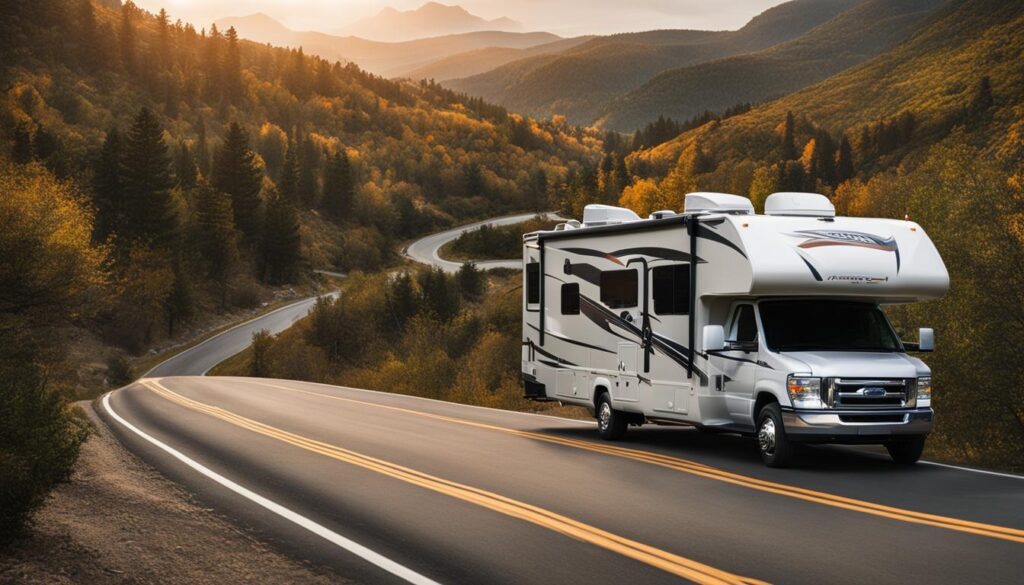
Nomad Internet
Nomad Internet is a popular choice for RVers looking for fast and reliable internet. With super-fast speeds, the ability to handle multiple devices, and virtually limitless high-speed data, Nomad Internet offers a reliable network for RV owners.
Whether you’re streaming your favorite shows, working remotely, or staying connected with friends and family, Nomad Internet ensures a seamless online experience on the road. With their RV internet plans, you can enjoy uninterrupted connectivity no matter where your adventures take you.
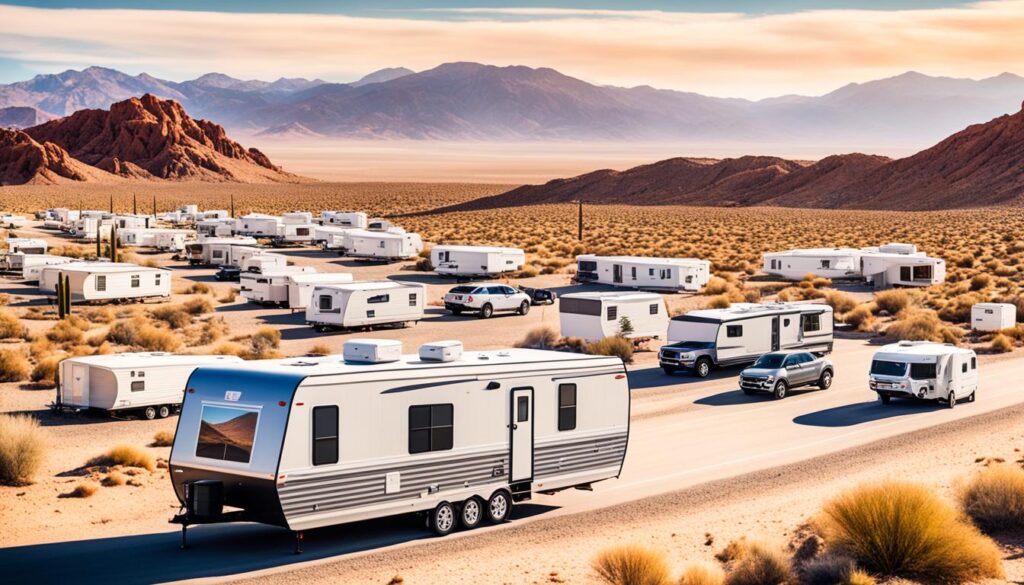
However, it’s important to note that the startup cost and customer service may be drawbacks for some users. While Nomad Internet provides excellent internet service, the initial investment and ongoing support may not be ideal for everyone.
For those who prioritize speed, reliability, and unlimited data, Nomad Internet is an excellent option to consider for a seamless RV internet experience.
Key Features:
- Super-fast speeds
- Ability to handle multiple devices
- Virtually limitless high-speed data
Drawbacks:
- Higher startup cost
- Customer service may vary
Your search for the best RV internet ends with Nomad Internet. Stay connected and enjoy a reliable online experience wherever your travels may lead you.
Skyroam Internet
Skyroam Internet offers a convenient and portable solution for RV internet connectivity. With its compact device and user-friendly app, Skyroam allows RVers to stay connected to the internet wherever they go. Whether you’re exploring remote destinations or simply need a reliable connection on the road, Skyroam provides a portable 4G internet service that keeps you connected.
One of the key advantages of Skyroam Internet is its portability. The compact device easily fits in your pocket or bag, allowing you to take it with you wherever you travel. This means you can have reliable internet access in your RV, at campsites, or even during outdoor adventures.
The Skyroam app makes it incredibly easy to connect to the internet. Simply turn on the device, open the app, and you’ll be able to securely connect your devices to the portable Wi-Fi network. The app also allows you to manage your data usage, check your data balance, and even purchase additional data if needed.
However, it’s important to consider the limitations of Skyroam Internet. While the service provides convenience and portability, the reliability of the signal may vary depending on your location. In remote or rural areas with weak cellular coverage, you may experience slower speeds or difficulty connecting to the internet.
Additionally, Skyroam offers high-speed data up to a certain threshold, after which your speeds may be reduced. This means that if you heavily rely on high-speed internet for tasks such as video streaming or video conference calls, you may need to monitor your data usage to avoid reaching the threshold and experiencing slower speeds.
Key Features of Skyroam Internet:
- Portable and compact device
- User-friendly app for easy connectivity
- Ability to connect multiple devices
- Manage data usage and purchase additional data through the app

“Skyroam provides a convenient and portable solution for RV internet. With its compact device and user-friendly app, staying connected on the go has never been easier.”
Cricket Wireless
When it comes to reliable internet connectivity for your RV, Cricket Wireless, a subsidiary of AT&T, offers a dependable option. With Cricket Wireless, you can enjoy a fast and stable network that keeps you connected throughout your travels.
Cricket Wireless provides the option for 90GB of high-speed data, ensuring that you have enough data to meet your internet needs while on the road. Whether you’re working remotely, streaming your favorite shows, or staying connected with friends and family, Cricket Wireless has you covered.
To further enhance your RV internet experience, you can make use of the Nighthawk router. The Nighthawk router is designed to provide a seamless connection and improved network performance, ensuring that you can enjoy fast and reliable internet wherever you go.
However, it’s important to consider the monthly cost and the need for a separate Nighthawk router when choosing Cricket Wireless as your RV internet provider. Evaluating these factors will help you determine if Cricket Wireless is the right choice for your internet needs.
| Pros | Cons |
|---|---|
| Reliable network | Monthly cost |
| 90GB of high-speed data | Separate Nighthawk router required |
| Option for stable connectivity |
Overall, Cricket Wireless provides a reliable internet connection for RV owners, with the option to customize your data plan and enhance your network with the Nighthawk router. Consider your budget and hardware requirements before making your decision.
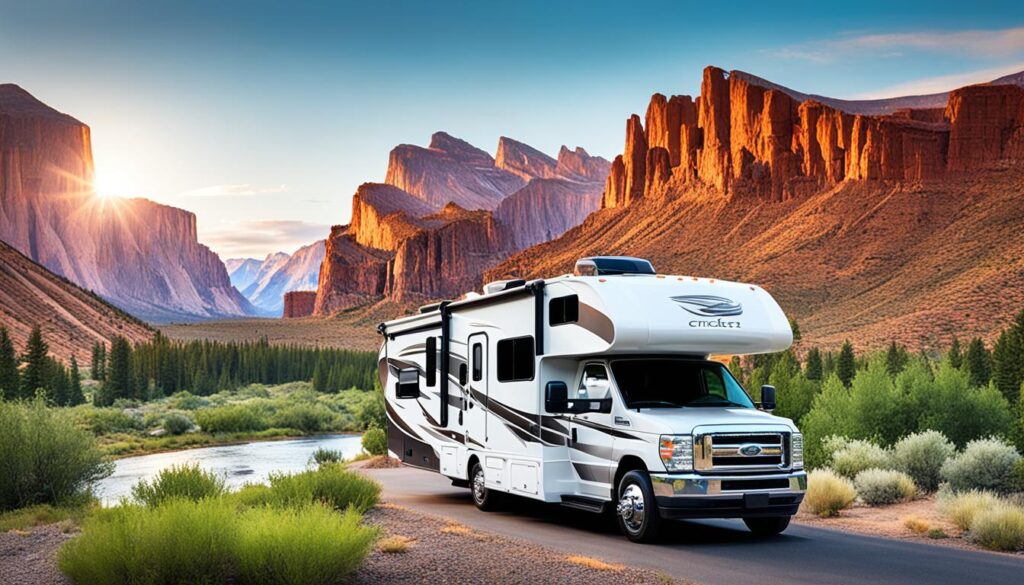
Different RV Internet Options
When it comes to staying connected on the road, there are several RV internet options to choose from. Whether you’re a full-time RVer or just enjoy occasional road trips, it’s important to have reliable connectivity wherever you go. Here are some popular options to consider:
Mobile Hotspots
Mobile hotspots are portable devices that allow you to connect to the internet using a cellular data connection. These devices create a Wi-Fi network that you can connect your devices to, providing internet access wherever you have a cell signal. Mobile hotspots are a convenient option for RVers who need internet access on the go. They offer flexibility, allowing you to choose from different cellular providers and data plans to suit your needs.
Wi-Fi Extenders
Wi-Fi extenders are devices that amplify and extend the range of an existing Wi-Fi network. They can be useful for RVers who frequently stay at campgrounds or RV parks that offer Wi-Fi. With a Wi-Fi extender, you can boost the signal to reach areas of your RV that are farther away from the source, ensuring a stronger and more reliable connection. Keep in mind that the quality and speed of the campground’s Wi-Fi will still affect your internet experience.
Portable 4G Internet Service
Portable 4G internet service, such as the services offered by providers like Nomad, allows you to have a dedicated data plan specifically for your RV. These services use cellular networks to provide internet access, similar to mobile hotspots. However, portable 4G internet service typically offers higher data allowances and may have better coverage in rural or remote areas. They are a great option for RVers who rely heavily on internet connectivity for work or entertainment.
Mobile Satellite Internet
Mobile satellite internet provides internet access using satellites orbiting the Earth. This option is ideal for RVers who frequently travel to remote areas where traditional cellular signals may be weak or nonexistent. Providers like Starlink, Viasat, and HughesNet offer reliable satellite internet services suitable for RV use. Keep in mind that mobile satellite internet may require a fixed space for the satellite dish and can come with data limitations or contracts.
Each RV internet option has its own advantages and considerations. It’s important to assess your specific needs, such as required speed, coverage area, and budget, before choosing the option that best suits your requirements.
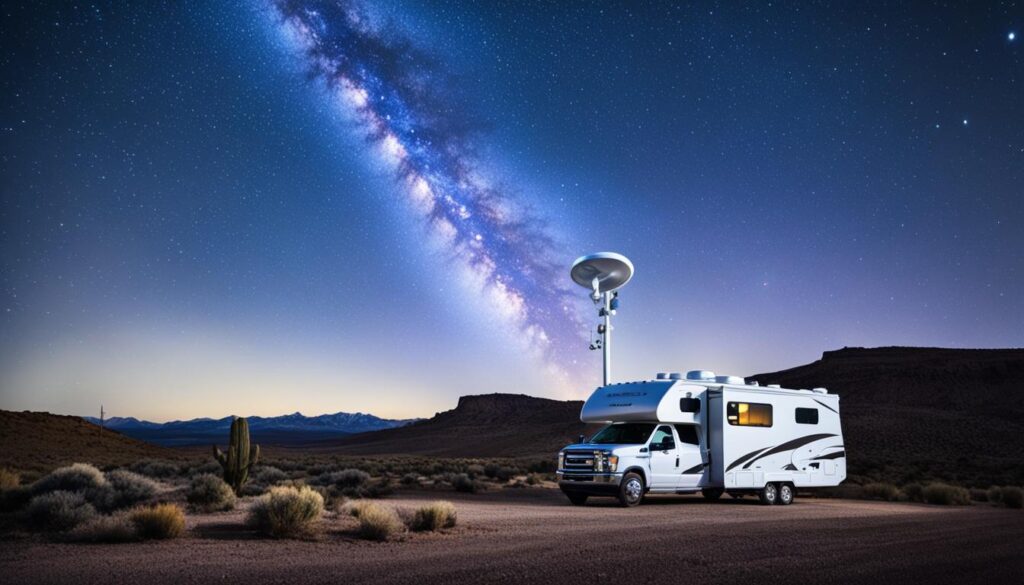
| RV Internet Option | Pros | Cons |
|---|---|---|
| Mobile Hotspots |
|
|
| Wi-Fi Extenders |
|
|
| Portable 4G Internet |
|
|
| Mobile Satellite Internet |
|
|
Satellite Internet
Satellite internet is a more permanent solution for RVs and is ideal for those who plan to park their RV in one location for an extended period. Satellite providers such as Starlink, Viasat, and HughesNet offer reliable connections even in remote areas, ensuring that you stay connected wherever your RV takes you.
Advantages of Satellite Internet
- Reliable connectivity even in remote areas
- Wide coverage range
- Ability to handle multiple devices
- Fast speeds for streaming and browsing
However, it’s important to note that satellite internet may require a fixed space for the satellite dish installation, typically on the roof of your RV. Additionally, some satellite providers may have data throttling policies or require long-term contracts.
| Satellite Provider | Pros | Cons |
|---|---|---|
| Starlink | Fast speeds High-speed data caps Low latency | Availability limited to certain areas Price may be higher Equipment and installation costs |
| Viasat | Wide coverage Various plan options Unlimited data plans available | Speeds may vary depending on location Potential data throttling Contracts required |
| HughesNet | Large coverage area Available in rural and remote locations Multiple plan options | Speeds may be slower during peak times Data limits and potential data throttling Contracts required |
Free Wi-Fi Hotspots
For those who are traveling for shorter periods or not using their RV as their primary residence, relying on free Wi-Fi hotspots can be a cost-effective option. Many campgrounds offer free Wi-Fi, and there are also public Wi-Fi hotspots available in coffee shops and other public places. However, it’s important to consider the reliability and security of public Wi-Fi.
When using campground Wi-Fi:
- Check with the campground staff about the availability and strength of their Wi-Fi signal.
- Understand any usage limitations or restrictions that may apply.
- Be aware that campground Wi-Fi may experience slower speeds during peak times.
- Consider investing in a Wi-Fi extender to boost the signal within your RV if you’re positioned farther away from the campground’s access point.
When using public Wi-Fi hotspots:
- Be cautious when connecting to public Wi-Fi networks as they may not always be secure.
- Avoid accessing sensitive information or conducting financial transactions while connected to public Wi-Fi.
- Consider using a virtual private network (VPN) to encrypt your internet connection and protect your data.
Remember, while free Wi-Fi hotspots can be a convenient and cost-effective way to stay connected while on the road, it’s essential to prioritize your online security and take necessary precautions.
Benefits of Using Free Wi-Fi Hotspots
There are several advantages to utilizing free Wi-Fi hotspots during your RV travels:
- Cost savings: Instead of paying for a separate internet connection, you can take advantage of existing free Wi-Fi networks.
- Convenience: Free Wi-Fi hotspots allow you to quickly connect to the internet without the need for additional equipment or data plans.
- Availability: Many popular travel destinations, coffee shops, and public spaces offer free Wi-Fi access, ensuring you can stay connected wherever you go.
However, it’s important to keep in mind the potential limitations and risks associated with free Wi-Fi hotspots. While they can be a convenient option, the quality of the connection and the security of your data may vary.
Paid Hotspots
For a reliable mobile internet connection while on the road, consider the paid hotspots offered by major cellular providers such as AT&T, Verizon, and T-Mobile. These hotspots are equipped with fast and efficient connectivity options, allowing you to stay connected wherever your RV takes you.
To access these paid hotspots, you will typically need a data plan from the respective provider. These plans can be used with a mobile hotspot device or a dedicated cellular router, providing you with a stable and secure internet connection.
When considering paid hotspots, it’s essential to research the availability and cost of data plans. Compare the offerings from AT&T, Verizon, and T-Mobile to determine which provider and plan best align with your needs and budget.
“With paid hotspots from leading providers like AT&T, Verizon, and T-Mobile, you can enjoy reliable and convenient RV internet access on the go.”
Comparison of Data Plans
| Provider | Plan | Data Allowance | Monthly Cost |
|---|---|---|---|
| AT&T | Unlimited Plus | Unlimited high-speed | $50 |
| Verizon | Get More Unlimited | 75GB high-speed | $80 |
| T-Mobile | Magenta MAX | 40GB high-speed | $70 |
Table: A comparison of data plans offered by AT&T, Verizon, and T-Mobile for paid hotspots. Data allowances and monthly costs vary, so choose the plan that best fits your internet usage needs and budget.
Image: A visual representation of paid hotspots, offering reliable and convenient internet access for RVers on the go.
Mobile Hotspots
When it comes to reliable connectivity on the go, mobile hotspots are a popular choice for RVers. One such option is offered by Nomad, a leading provider of cellular internet services for RV owners. With a Nomad mobile hotspot, you can enjoy a seamless internet experience in multiple locations, ensuring that you stay connected wherever your journey takes you.
Mobile hotspots work by using cellular data connections from various carriers, offering you flexibility and coverage across different areas. These compact devices allow you to create a private Wi-Fi network, enabling you to connect multiple devices and access the internet with ease.
However, it’s important to evaluate the cost and coverage of the Nomad service before making a decision. Consider the pricing plans and data limits to ensure they align with your usage needs. Additionally, check the coverage maps provided by Nomad to ensure that the service is available in the areas you plan to travel to.
Using Cellphone as a Hotspot
Another option for RV internet is utilizing your cellphone as a hotspot. Most major cell phone carriers offer data plans that include hotspot capabilities, allowing you to connect your devices to the internet on the go. This offers flexibility and convenience, as you can access the internet using your existing cellphone plan. However, there are important factors to consider when using your cellphone as a hotspot.
Firstly, it is crucial to check the availability and cost of hotspot-enabled data plans offered by your mobile carrier. Different carriers may have varying options and pricing structures for data plans, so it’s important to find a plan that suits your specific needs and budget.
Furthermore, it’s essential to understand the limitations of relying solely on your cellphone for internet access. Using your cellphone as a hotspot may consume a significant amount of data, especially if you frequently stream videos or engage in other data-intensive activities. As a result, you may need to keep a close eye on your data usage to avoid exceeding your plan’s limits or incurring additional charges.
Additionally, depending on your location and mobile carrier, the coverage and network reliability of your cellphone’s hotspot may vary. While major carriers generally provide widespread coverage, it’s important to research and review coverage maps to ensure that your RV travels are within areas where your carrier’s signal is strong.
Despite these considerations, using your cellphone as a hotspot can be a convenient and cost-effective option for RV internet. It allows you to leverage your existing mobile carrier data plan and stay connected while on the move.
Choosing the Best RV Internet Option
When it comes to selecting the best internet option for your RV, there are several factors to consider. Your specific needs, budget, and location play an essential role in determining the right choice for you. Each option, whether it’s a mobile hotspot, satellite internet, or utilizing your cellphone as a hotspot, comes with its own set of advantages and disadvantages.
Speed, reliability, coverage, and cost are key factors to evaluate when making a decision. Consider the internet service provider’s reputation for delivering fast and reliable connectivity on the road. Ensure that the coverage is available in the areas where you plan to travel, particularly if you frequently explore remote destinations. Additionally, keeping your budget in mind, compare the costs of different RV internet service providers and their data plans.
By carefully considering these factors, you can determine the best RV internet option that meets your unique needs. Whether you require consistent high-speed internet for work or prefer a cost-effective solution for occasional internet usage, making an informed decision will result in a seamless connectivity experience during your travels.
FAQ
What factors should I consider when choosing RV internet?
Factors to consider when choosing RV internet include your specific requirements and needs, such as the number of Zoom calls and video content uploads, your location, the duration of your trips, and your budget.
What is Nomad Internet?
Nomad Internet is a popular choice for RVers looking for fast and reliable internet. It offers super-fast speeds, the ability to handle multiple devices, and virtually limitless high-speed data.
What is Skyroam Internet?
Skyroam Internet provides a portable and easy-to-use solution for RV internet. Its compact device and app features allow users to connect to the internet on the go.
What is Cricket Wireless?
Cricket Wireless is a subsidiary of AT&T that offers a reliable internet connection for RVs. It provides options for 90GB of high-speed data and the use of the Nighthawk router.
What are the different RV internet options available?
The different RV internet options available include mobile hotspots, Wi-Fi extenders, portable 4G internet service, and mobile satellite internet.
What are some major satellite providers for RV internet?
Starlink, Viasat, and HughesNet are major satellite providers in the US that offer reliable connections even in remote areas.
Can I rely on free Wi-Fi hotspots for RV internet?
Yes, relying on free Wi-Fi hotspots can be a cost-effective option for RV internet, as many campgrounds offer free Wi-Fi, and public Wi-Fi hotspots are available in various places.
What are paid hotspots for RV internet?
Paid hotspots offered by major cellular providers, such as AT&T, Verizon, and T-Mobile, provide a mobile internet connection while on the road. These hotspots typically require a data plan and can be used as a mobile hotspot or with a dedicated cellular router.
What are mobile hotspots for RV internet?
Mobile hotspots, such as those offered by Nomad, provide cellular internet from various carriers, allowing for reliable connectivity on the go.
Can I use my cellphone as a hotspot for RV internet?
Yes, you can use your cellphone as a hotspot for RV internet. Most major cell phone carriers offer data plans that include hotspot capabilities, allowing you to connect your devices to the internet on the go.
How do I choose the best RV internet option?
When choosing the best RV internet option, it’s important to consider your specific needs, budget, and location. Factors such as speed, reliability, coverage, and cost should be evaluated to select the RV internet service provider that best meets your requirements.
